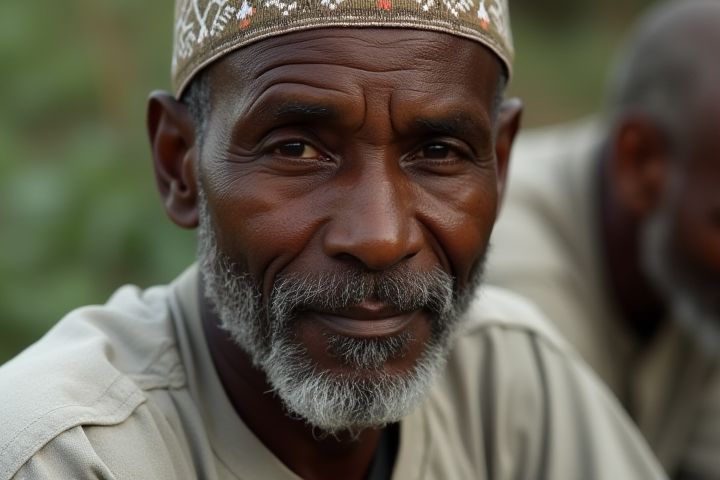
Nigeria, the most populous country in Africa, boasts a diverse demographic landscape, with over 200 million residents representing more than 250 ethnic groups, including the Hausa, Yoruba, and Igbo. The median age in Nigeria is approximately 18 years, reflecting a youthful population that presents both opportunities and challenges for economic growth and development. Urban areas, notably Lagos and Abuja, are experiencing rapid population growth, leading to increased migration trends as people seek better employment prospects and living conditions. Furthermore, Nigeria is characterized by a high fertility rate of about 5.4 children per woman, influencing family structures and education systems. With various religious affiliations, predominantly Islam and Christianity, Nigeria's demographics play a crucial role in shaping cultural dynamics and societal interactions.
Diverse ethnic groups
Nigeria is a country renowned for its rich tapestry of diverse ethnic groups, with over 250 distinct identities. The three largest groups--Hausa-Fulani, Yoruba, and Igbo--exemplify the nation's cultural variety, each contributing unique languages, traditions, and historical narratives. This ethnic diversity is accompanied by significant religious plurality, predominantly Islam, Christianity, and indigenous beliefs, shaping social dynamics and political landscapes. Understanding these demographics is essential for marketing strategies, policy-making, and fostering social cohesion within Nigeria's multifaceted society.
Rapid population growth
Nigeria exhibits rapid population growth, making it one of the most populous countries in Africa, with an estimated population exceeding 200 million. This demographic trend is attributed to high fertility rates, particularly in rural areas, where family sizes can reach six children or more. Urban migration is also significant, as individuals seek better economic opportunities in cities, further contributing to population density. As a result, effective resource management and infrastructure development are crucial to accommodate this burgeoning population and ensure sustainable growth.
Youthful population
Nigeria boasts one of the world's youngest populations, with approximately 60% of its 200 million citizens under the age of 25. This youthful demographic represents a significant potential for economic growth, innovation, and cultural dynamism. Urban centers like Lagos and Abuja are experiencing rapid youth migration, fueling a burgeoning demand for jobs, education, and technology. Engaging this vibrant demographic in productive initiatives is essential for harnessing their talents and addressing the challenges of unemployment and underemployment in the nation.
Urban-rural distribution
Nigeria's demographics reveal a complex urban-rural distribution, with approximately 50% of the population residing in urban areas as of 2023. Major cities like Lagos, Abuja, and Port Harcourt serve as economic and cultural hubs, attracting people from rural locales seeking job opportunities and improved living standards. In contrast, rural regions often experience challenges such as limited access to healthcare, education, and infrastructure, impacting their development. Understanding this distribution is crucial for policymakers aiming to address the disparities between urban and rural communities effectively.
High fertility rate
Nigeria experiences one of the highest fertility rates globally, with an average of about 5.3 children per woman as of 2023. This high birth rate significantly contributes to a rapidly growing population, projected to exceed 400 million by 2050. Such demographics place considerable strain on resources, healthcare, and education systems, necessitating strategic planning and policy development. You can see how this affects urbanization trends, as families migrate toward cities in search of better opportunities and living conditions.
Religious diversity
Nigeria is characterized by a rich tapestry of religious diversity, with approximately 50% of the population practicing Islam and another 50% adhering to Christianity, predominantly in the southern regions. The northern states are primarily Muslim, with significant cultural influences from the Fulani and Hausa ethnic groups, while the southern states showcase a plethora of denominations, including Catholicism and various Protestant branches. Additionally, indigenous beliefs and traditional practices persist among various communities, contributing further to the religious mosaic. Understanding this diversity is crucial for fostering interfaith dialogue and promoting social cohesion in a nation where religion plays a pivotal role in daily life and governance.
Gender ratio balance
Nigeria's demographics are characterized by a complex gender ratio, with approximately 102 males for every 100 females, highlighting the nation's ongoing efforts toward gender balance. This ratio varies significantly across different regions, influenced by cultural practices, educational accessibility, and economic opportunities. Women comprise about 49% of Nigeria's population, playing vital roles in both the workforce and family structure, which continues to evolve with increasing awareness of gender equality. Understanding this demographic landscape is essential for policy-making and fostering inclusive development initiatives tailored to address the unique needs of both genders.
Migration trends
Nigeria's migration trends highlight significant internal and international movements, driven by factors such as economic opportunities, conflicts, and environmental changes. Urban centers like Lagos and Abuja attract rural residents seeking better livelihoods, while the North experiences high emigration rates due to security challenges and limited resources. On a broader scale, many Nigerians are migrating to countries like the United States, the United Kingdom, and Canada in search of education and job prospects. Understanding these demographics is crucial for policymakers to address the implications of migration on social services and economic development.
Regional disparities
In Nigeria, regional disparities significantly influence demographic trends, with distinct differences in population density, age distribution, and economic activity across various states. The northern regions, characterized by a younger population and higher fertility rates, present contrasting socio-economic challenges compared to the more urbanized and economically vibrant southern states. Cities like Lagos and Abuja experience rapid urbanization, attracting migrants in search of better opportunities, while rural areas struggle with limited access to education and healthcare. Understanding these demographic dynamics is essential for policymakers to address inequality and promote sustainable development throughout the nation.
Socio-economic challenges
Nigeria's demographics reveal a youthful population, with over 60% under the age of 25, presenting both opportunities and socio-economic challenges. High unemployment rates, particularly among youth, contribute to widespread poverty, impacting access to education and healthcare. Urban migration exacerbates infrastructure strain in cities like Lagos and Abuja, leading to inadequate housing and sanitation. Addressing these socio-economic issues is crucial for fostering sustainable development and improving the overall quality of life for Nigerians.
